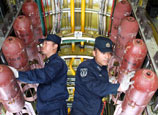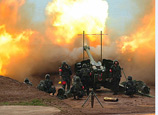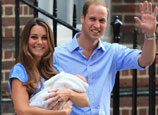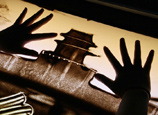
MADRID, July 25 (Xinhua) -- King Juan Carlos and Queen Sofia of Spain visited the victims of the train crash which claimed 80 lives on Wednesday evening in the city of Santiago de Compostela in north-west Spain.
Thursday evening saw the King and Queen, in company of the President of Galicia, Alberto Nunez Feijoo and Public Works Minister, Ana Pastor, visited Hospital Clinic in Santiago where some 90 people still receiving treatment are being treated for the injuries they sustained when the high-speed train between Madrid and Ferrol came off a bend with an 80 km/h speed limit at a speed thought to be close to 190 km/h
After the visit the King gave his condolences for what is the second worst rail accident in Spanish history and highlighted the pain that is being felt throughout the country.
"All I can say is that all Spaniards are united at this moment and we are all with the victims and their families, with the friends of the victims and we hope that within this misfortune we can all help with the different problems they might have," he said.
"I am speaking of those who are suffering as a result of this sad event, who as human beings and as Spaniards, move us and fill us with pain and sadness in order to transmit our deepest affection and the closeness and solidarity of the Royal Family," he said, before being taken to the crash site.
Earlier in the day, Prime Minister, Mariano Rajoy, who was born in Santiago, also visited the accident site and the hospital, where he promised help to those affected by the tragedy, including 35 people described as being in a critical condition.
"They are not going to be left alone; the solidarity of the Spanish people will accompany them always," said Rajoy, from the headquarters of the Galician regional parliament.
"This terrible accident is going to remain in our minds for a long time," he said in reference to the fact that Thursday is the Feast of St John (Santiago) the Parton of Spain and the Galician region. All celebrations planned for the weekend have now been cancelled as a result of the accident.
Meanwhile Feijoo paid homage to the work of emergency services and of ordinary people who had raced to aid the injured after the accident, including firemen, who immediately called off strike action in order to give help.
"The 24th of July, 2013, the day that the derailment of the train which took so many lives and the dreams of so many people, will also be remembered as the day in which so many Gallegos filled the health centers opened to donate blood. The day in which people without name went down to the tracks to try and help the injured and the day in which volunteers from different places came to Compostela to accompany and to attend and console the families of the victims," said the president of Galicia on Thursday morning.
Three days of national mourning have been declared in Spain and seven in Galicia in memory of those who died, while attention now turns to discovering the exact cause of the tragedy.
















 Migrant children’s dream of stage
Migrant children’s dream of stage


![]()
